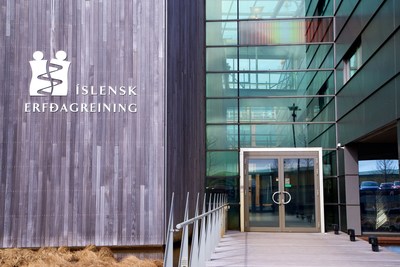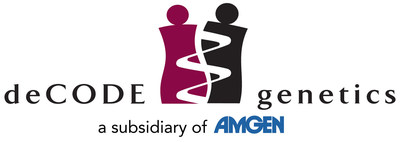The combination of genomics, transcriptomics and proteomics sheds light on autoimmune thyroid disease, other autoimmune diseases and AML
REYKJAVIK, Iceland, June 24, 2020 /PRNewswire/ -- Scientists at deCODE genetics, a subsidiary of Amgen, and their collaborators from the Icelandic healthcare system, University of Iceland and the Karolinska Institute in Sweden, today publish a study in Nature, comparing over 30 thousand patients with autoimmune thyroid disease from Iceland and UK with 725 thousand controls. Autoimmune thyroid disease (AITD) is the most common autoimmune disease and is highly heritable. The scientists found 99 sequence variants that associate with autoimmune thyroid disease and 84 of those had not been associated with the disease before.
One of the newly discovered sequence variants is in a gene that codes for the FLT3 receptor (fms-related tyrosine kinase 3) on blood cells and immune cells, and is of large interest for several reasons.
First, it strongly increases the risk of autoimmune thyroid disease and other autoimmune diseases, both systemic lupus erythematosus (SLE), rheumatoid arthritis (RA) and celiac disease. These diseases are all characterized by autoantibodies and are more common in women than men. Furthermore, patients with these diseases are quite often affected by autoimmune thyroid disease as well.
Second, it is known that activating somatic mutations in the FLT3 gene associate with acute myeloid leukemia (AML). Therefore, the scientists tested whether this FLT3 germline variant, affects the risk of AML like it increases the risk of autoimmune diseases. It turned out that it almost doubles the risk of AML, but not the risk of cancer overall.
Third, it is quite remarkable that this variant in FLT3, which is in an intron of the gene and does not directly affect coding sequence, can have so strong effect on disease risk. It turns out that the variant introduces a stop codon in one-third of the transcripts, which results in a shorter protein that lacks the kinase part, which is essential for its function.
Finally, this variant in FLT3 affects the plasma levels of several other proteins in the body, especially the ligand of FLT3, resulting in almost double the level in carriers. This molecular couple, the FLT3 receptor and its ligand, has a key role in the development of blood cells that are important in both acute myeloid leukemia and immune responses. Hence, this variant is a loss of function mutation that through compensatory increase in the level of the ligand, acts as a gain of function.
"This report describes a novel major risk gene for several autoimmune diseases, discovered through a genome-wide study on autoimmune thyroid disease, and how the risk variant affects the gene product, FLT3, and consequently the level of the ligand to the FLT3 receptor in blood, thereby demonstrating its functional importance," says Prof. Saedis Saevarsdottir, scientist at deCODE genetics and first author on the paper
"The discoveries presented in this paper are based on the sequential application of genomics, transcriptomics and proteomics; the combination of these three omics in a hypothesis independent manner yields a remarkably powerful approach to the study of human disease," says Kari Stefansson, CEO of deCODE genetics and senior author on the paper.
Based in Reykjavik, Iceland, deCODE is a global leader in analyzing and understanding the human genome. Using its unique expertise in human genetics combined with growing expertise in transcriptomics and population proteomics and vast amount of phenotypic data, deCODE has discovered risk factors for dozens of common diseases and provided key insights into their pathogenesis. The purpose of understanding the genetics of disease is to use that information to create new means of diagnosing, treating and preventing disease. deCODE is a wholly-owned subsidiary of Amgen (NASDAQ: AMGN).
Video - https://www.youtube.com/watch?v=Wa4OGAejKTs
Photo - https://mma.prnewswire.com/media/1195282/deCODE_genetics_headquarters.jpg
Logo - https://mma.prnewswire.com/media/974116/deCODE_genetics_Logo.jpg
Contact:
Thora Kristin Asgeirsdottir
PR and Communications
deCODE genetics
thoraa@decode.is
+354 894 1909



